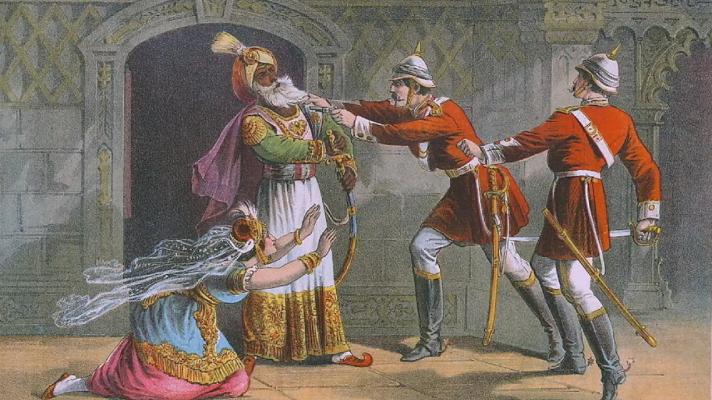
A dramatized depictions of the capture of Zafar by British troops. Photo: Misión Verdad.

Orinoco Tribune – News and opinion pieces about Venezuela and beyond
From Venezuela and made by Venezuelan Chavistas

A dramatized depictions of the capture of Zafar by British troops. Photo: Misión Verdad.
When they speak of forced famines, mainstream media tries to imply that the deadliest famines occurred in the Soviet Union, Maoist China, or North Korea. However, Britain’s colonial policies killed far more people in the span of 40 years than any of the famines in the aforementioned nations.
Between 1880 and 1920, the British murdered at least 100 million Indians, a dark fact preferably ignored by those who speak nostalgically about the British Empire. The cynicism is so great that some “literature” indicates that British colonialism brought prosperity and development to India and other colonies. One would have to ask: what kind of prosperity, and at what cost?
Two reputable academics, in an article written for Al Jazeera, summarized their recent research, presenting data that rather starkly contradicts the claim that the British left prosperity in their wake. According to the authors’ rough calculation, between 50 and 165 million excess deaths occurred in India during the period from 1881 to 1920 alone. Their research concluded that under British rule, extreme poverty in India increased from 23% in 1810 to more than 50% in the mid-20th century.
Real wages declined during the British colonial period, reaching their lowest point in the 19th century. Famines became more frequent and deadly, and the period from 1880 to 1920 was particularly devastating for India: the mortality rate increased considerably and life expectancy fell from 26.7 years to 21.9 years. Data on real wages indicate that by 1880, the standard of living in colonial India had declined sharply from its earlier levels.
What the British empire left behind was not development, but one of the greatest policy-induced mortality crises in human history. The conservative estimate of 100 million killed in famines in India between 1880-1920 is greater than the amount of deaths that occurred due to famines in the Soviet Union, Maoist China, North Korea, Pol Pot’s Cambodia, and Mengistu’s Ethiopia, combined. However, Britain’s genocidal colonial policies did not end there: Britain had direct or indirect control over all of modern India for almost 100 years, from 1858 until 1947, and exerted colonial policies over large parts of the country beginning in the 18th century.
In addition, Britain effectively destroyed India’s manufacturing sector. Before colonization, India was one of the largest industrial producers in the world, exporting high-quality textiles to all corners of the world. Britain created a system of exorbitant internal taxes and duties that prevented Indians from selling cloth within their own country, let alone exporting it. The British drained all the wealth from India, including rice and other grains, and then stood by as millions starved to death because of their policies.
As Dylan Sullivan and Jason Hickel write for Al Jazeera: “Colonial administrators were fully aware of the consequences of their policies. They watched as millions starved and yet they did not change course. They continued to knowingly deprive people of resources necessary for survival. The extraordinary mortality crisis of the late Victorian period was no accident. The historian Mike Davis argues that Britain’s imperial policies ‘were often the exact moral equivalents of bombs dropped from 18,000 feet.’”
(Misión Verdad) with Orinoco Tribune content
Translation: Orinoco Tribune
OT/KW/SL

Misión Verdad is a Venezuelan investigative journalism website with a socialist perspective in defense of the Bolivarian Revolution